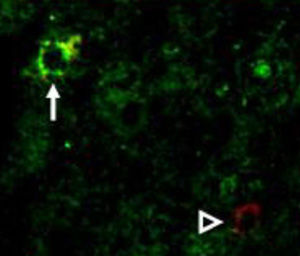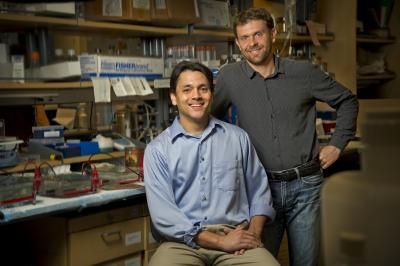UR study reveals chemo's toxicity to brain, possible treatment
Researchers have developed a novel animal model showing that four commonly used chemotherapy drugs disrupt the birth of new brain cells, and that the condition could be partially reversed with the growth factor IGF-1. Published in Cancer Investigation, the University of Rochester Medical Center study is relevant to the legions of cancer survivors who experience a frustrating decline in cognitive function after chemotherapy treatment, known as chemo-brain.
"It is not yet clear how our results can be generally applied to humans but we have taken a very significant step toward reproducing a debilitating condition and finding ways to treat it," said Robert Gross, M.D., Ph.D., professor of Neurology and of Pharmacology and Physiology at URMC and principal investigator of the study.
Chemo-brain is a newly recognized condition. The URMC team found surprising data about how the four drugs impact the brain, Gross said, and they are the first to report that the experimental insulin-like growth factor, IGF-1, may be beneficial.
The study was funded by a Department of Defense grant to Gross and by the National Cancer Institute to co-investigator and lead author, Michelle Janelsins, Ph.D., research assistant professor of Radiation Oncology at the James P. Wilmot Cancer Center.
The URMC team hypothesized that cognitive problems might stem from chemo destroying the ability of brain cells to regenerate in the hippocampus, which is primarily involved in memory formation and mood. They sought a way to find the mechanisms at work and to manage the adverse effects on the brain before, during and after chemotherapy treatment.
Researchers also hypothesized that chemotherapy drugs known to cross the blood-brain barrier would be a bigger threat to brain cells than drugs that do not cross the blood-brain barrier. To test the hypothesis, they investigated the effects of routinely used doses of cyclophosphamide and fluorouracil, which do cross into the brain, against paclitaxel and doxorubicin, which do not.
Unexpectedly, all four drugs caused a significant breakdown in brain cell proliferation in the animal model. A statistical analysis of cell regeneration showed a 15.4 percent reduction in new brain cells following fluorouracil, a 30.5 percent reduction following cyclophosphamide, a 22.4 percent reduction following doxorubicin, and a 36 percent reduction following paclitaxel.
"It could be that all of the chemo drugs cross into the brain after all, or that they act via peripheral mechanisms, such as inflammation, that could open up the blood-brain barrier," Gross said.
"Neurogenesis can also be altered by stress, sleep deprivation and depression, all of which are common among cancer patients," added Janelsins. "More thorough studies are needed to understand the interplay of these factors and the long-term effects of chemotherapy on the brain."
Researchers conducted a second study of a single high dose of cyclophosphamide, a mainstay of adjuvant chemotherapy for breast cancer, because chemo-brain is a frequent complaint of people receiving this drug. The single high dose resulted in a 40.9 percent reduction in newly divided brain cells, the study said.
In previous studies the experimental growth hormone IGF-1 had demonstrated that it could generally promote new brain cell development within the central nervous system. Thus, investigators chose to test its effect in the animal model.
They administered IGF-1 prior to and following a conventional cyclophosphamide multiple-dose regimen, and a single, high-dose of cyclophosphamide. The IGF-1 seemed to increase the number of new brain cells in both models, but was more effective in the high-dose model, the study concluded.
The research team plans to conduct additional studies which will allow them to further test the impact of IGF-1 and other related interventions on the molecular and behavioral consequences of chemotherapy.























































